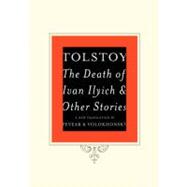
| Introduction | p. vii |
| The Prisoner of the Caucasus | p. 3 |
| The Diary of a Madman | p. 28 |
| The Death of Ivan Ilyich | p. 39 |
| The Kreutzer Sonata | p. 92 |
| The Devil | p. 164 |
| Master and Man | p. 209 |
| Father Sergius | p. 255 |
| After the Ball | p. 297 |
| The Forged Coupon | p. 307 |
| Alyosha the Pot | p. 368 |
| Hadji Murat | p. 374 |
| Glossary Of Caucasian Mountaineer Words | p. 489 |
| Notes | p. 491 |
| Table of Contents provided by Ingram. All Rights Reserved. |
The New copy of this book will include any supplemental materials advertised. Please check the title of the book to determine if it should include any access cards, study guides, lab manuals, CDs, etc.
The Used, Rental and eBook copies of this book are not guaranteed to include any supplemental materials. Typically, only the book itself is included. This is true even if the title states it includes any access cards, study guides, lab manuals, CDs, etc.
Excerpted from The Death of Ivan Ilyich and Other Stories by Larissa Volokhonsky, Leo Tolstoy
All rights reserved by the original copyright owners. Excerpts are provided for display purposes only and may not be reproduced, reprinted or distributed without the written permission of the publisher.